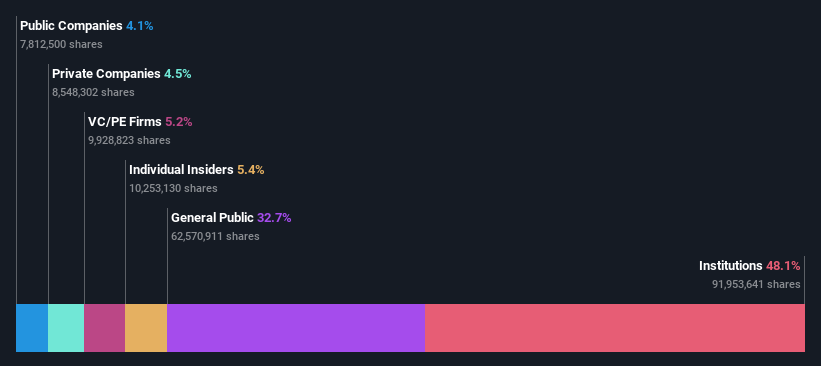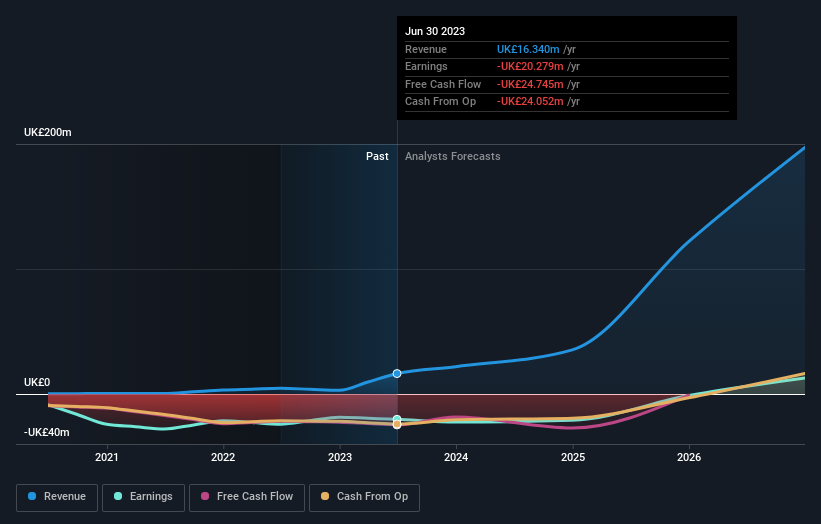Owning 21% shares,institutional owners seem interested in Invinity Energy Systems plc (LON:IES),
Key Insights
Institutions' substantial holdings in Invinity Energy Systems implies that they have significant influence over the company's share price
29% of the business is held by the top 24 shareholders
Using data from analyst forecasts alongside ownership research, one can better assess the future performance of a company
Every investor in Invinity Energy Systems plc (LON:IES) should be aware of the most powerful shareholder groups. And the group that holds the biggest piece of the pie are institutions with 21% ownership. That is, the group stands to benefit the most if the stock rises (or lose the most if there is a downturn).
Since institutional have access to huge amounts of capital, their market moves tend to receive a lot of scrutiny by retail or individual investors. As a result, a sizeable amount of institutional money invested in a firm is generally viewed as a positive attribute.
Let's delve deeper into each type of owner of Invinity Energy Systems, beginning with the chart below.
View our latest analysis for Invinity Energy Systems
What Does The Institutional Ownership Tell Us About Invinity Energy Systems?
Institutional investors commonly compare their own returns to the returns of a commonly followed index. So they generally do consider buying larger companies that are included in the relevant benchmark index.
As you can see, institutional investors have a fair amount of stake in Invinity Energy Systems. This can indicate that the company has a certain degree of credibility in the investment community. However, it is best to be wary of relying on the supposed validation that comes with institutional investors. They too, get it wrong sometimes. It is not uncommon to see a big share price drop if two large institutional investors try to sell out of a stock at the same time. So it is worth checking the past earnings trajectory of Invinity Energy Systems, (below). Of course, keep in mind that there are other factors to consider, too.
We note that hedge funds don't have a meaningful investment in Invinity Energy Systems. Schroder Investment Management Limited is currently the largest shareholder, with 9.7% of shares outstanding. In comparison, the second and third largest shareholders hold about 2.3% and 1.9% of the stock. In addition, we found that Lawrence Zulch, the CEO has 0.5% of the shares allocated to their name.
On studying our ownership data, we found that 24 of the top shareholders collectively own less than 50% of the share register, implying that no single individual has a majority interest.
While studying institutional ownership for a company can add value to your research, it is also a good practice to research analyst recommendations to get a deeper understand of a stock's expected performance. There are plenty of analysts covering the stock, so it might be worth seeing what they are forecasting, too.
Insider Ownership Of Invinity Energy Systems
The definition of company insiders can be subjective and does vary between jurisdictions. Our data reflects individual insiders, capturing board members at the very least. Company management run the business, but the CEO will answer to the board, even if he or she is a member of it.
Most consider insider ownership a positive because it can indicate the board is well aligned with other shareholders. However, on some occasions too much power is concentrated within this group.
We can see that insiders own shares in Invinity Energy Systems plc. As individuals, the insiders collectively own UK£2.3m worth of the UK£100m company. It is good to see some investment by insiders, but we usually like to see higher insider holdings. It might be worth checking if those insiders have been buying.
General Public Ownership
With a 14% ownership, the general public, mostly comprising of individual investors, have some degree of sway over Invinity Energy Systems. While this size of ownership may not be enough to sway a policy decision in their favour, they can still make a collective impact on company policies.
Next Steps:
It's always worth thinking about the different groups who own shares in a company. But to understand Invinity Energy Systems better, we need to consider many other factors. Take risks for example - Invinity Energy Systems has 1 warning sign we think you should be aware of.
But ultimately it is the future, not the past, that will determine how well the owners of this business will do. Therefore we think it advisable to take a look at this free report showing whether analysts are predicting a brighter future.
NB: Figures in this article are calculated using data from the last twelve months, which refer to the 12-month period ending on the last date of the month the financial statement is dated. This may not be consistent with full year annual report figures.
Have feedback on this article? Concerned about the content? Get in touch with us directly. Alternatively, email editorial-team (at) simplywallst.com.
This article by Simply Wall St is general in nature. We provide commentary based on historical data and analyst forecasts only using an unbiased methodology and our articles are not intended to be financial advice. It does not constitute a recommendation to buy or sell any stock, and does not take account of your objectives, or your financial situation. We aim to bring you long-term focused analysis driven by fundamental data. Note that our analysis may not factor in the latest price-sensitive company announcements or qualitative material. Simply Wall St has no position in any stocks mentioned.

 Yahoo Finance
Yahoo Finance 

